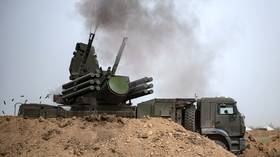The ticking time bomb that could crush oil markets

Libya’s oil production is down to less than 200,000 bpd, and the uncertainty surrounding the outage create complications for OPEC+ as it looks to cut deeper.
Libya’s civil war entered a dangerous new phase a few weeks ago when the Libyan National Army (LNA) and associated militias blockaded oil export terminals as a way of applying pressure on the Government of National Accord (GNA) in Tripoli. The standoff continues, and Libya’s output has plunged to around 180,000 bpd, according to estimates from late last week.
On Sunday, Libya’s Azzawiya Oil Refining Company said that it was ceasing refining operations for the time being because it does not have enough crude oil.
Also on rt.com Libyan National Oil Corporation declares ‘state of emergency’ after Haftar’s forces close eastern oil portsThe National Oil Company warned in January that production would ultimately fall to zero because storage would fill up and oil fields would need to be idled.
The outage is significant, totaling between 800,000 bpd and 1 million barrels per day (mb/d). Brent crude has collapsed below $55 per barrel because of the coronavirus, and the oil market appears largely indifferent to the disruption in Libya. The fear is over destroyed demand in China, and broader economic damage from the mass quarantine. Against that backdrop, it’s hard to imagine where Brent would be trading had the outage in Libya never occurred.
“What is more, Libyan oil production could recover again soon if agreement is reached next week in Geneva following the meeting now of the conflicting parties in Cairo,” Commerzbank wrote in a note on Monday. “Over 1 million barrels of additional oil per day from Libya could possibly push the Brent price towards the $50 per barrel mark in the short term.”
Now, OPEC+ is negotiating another round of cuts in order to keep the market from collapsing further. OPEC’s Joint Technical Committee (JTC) proposed 600,000 bpd in deeper reductions, and extending the cuts through the end of 2020.
If OPEC+ proceeds as expected, the additional 600,000-bpd cut will take the total cuts from 2.1 to 2.4 mb/d. Add in another 300,000 bpd of unilateral reductions from Saudi Arabia and the total becomes 2.7 mb/d.
But how does Libya figure into this?
Libya could stay offline or come back online at any moment. “In our view, the oil market might get confused about the role of Libya in relation to the proposed OPEC+ deal,” Standard Chartered wrote in a report on Tuesday. “We understand that the forecast market balances used to calibrate the proposed cut assume that Libya’s output returns immediately at its previous 1.1mb/d.”
The OPEC+ accounting assumes Libya bounces back, and the reason for that is “to remove Libyan exports as a potential bearish factor,” Standard Chartered added. “[I]f they were to return quickly it would require no fine-tuning of the agreement and any slower return would represent an additional market tightening.”
Also on rt.com Libya’s oil industry turns to China for helpThe investment bank said that it’s possible that “the market might not fully appreciate this Libyan aspect in the short run; it could incorrectly see the 0.6mb/d cut as purely determined by the coronavirus and think that extra Libyan exports would require further cuts from OPEC+ to balance the market.”
So, OPEC+ is assuming Libya bounces back so that there is no bearish surprise. But the civil war could just as easily drag on indefinitely. If that occurs, that would tighten up the market relative to what OPEC+ is assuming. Recent negotiations in Geneva did not lead to a ceasefire and the war continues. Another round of talks is scheduled for later this month.
“This means the blockade is likely to remain in place at least a few more weeks,” JBC Energy wrote in a note. However, the firm said that uncertainty will persist, and there is a formidable challenge for OPEC+ in terms of timing. “Libya’s return could easily come sooner than the [OPEC+] cuts, whilst it would in any case most likely outpace them in terms of size,” JBC added.
This article was originally published on Oilprice.com














